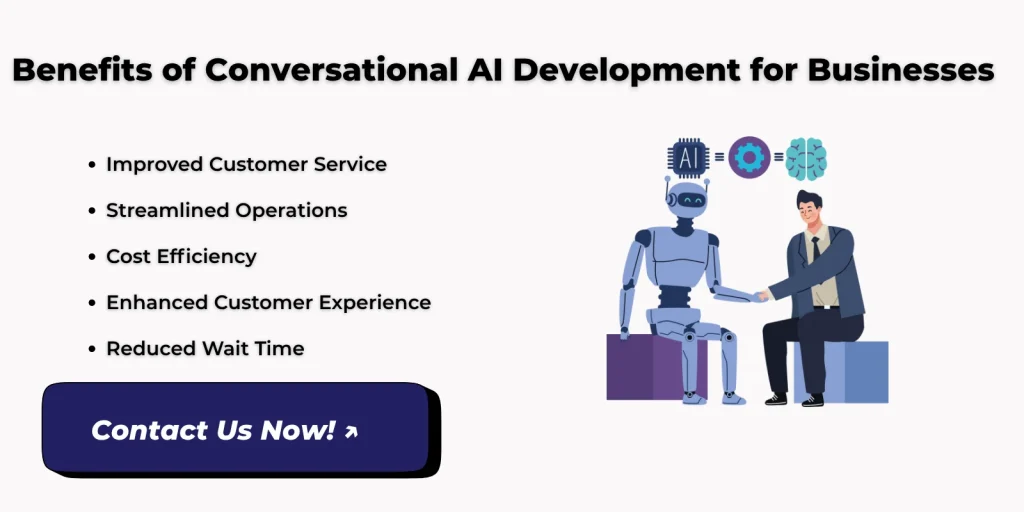Companies prioritise good customer service. Gartner predicts conversational user interfaces and generative AI will transform customer service by 2028. We predict 80% of customer support firms to use generative AI to improve customer experience by 2025. That’s why conversational AI is popular. In this blog we will talk in detail about conversational AI and what are the benefits it’s serving the industry.
What is Conversational AI, and How Does it Differ From Traditional AI?
Modern AI technology allows machines to understand and speak like humans. Chatbots and virtual assistants exemplify conversational AI. They understand client questions and reply like human customer agents.
Machine learning and NLP are used in the benefits of conversational AI systems to mimic human speech and discussions. This technology enables real-time customer service, operational efficiency, and cost reduction.
Let’s compare benefits of conversational AI to classical AI now that you know what it is.
Benefits of Conversational AI mimic human interaction using NLP, while standard AI chatbots focus on keyword recognition.
While traditional AI chatbots need training, conversation AI models learn from user interactions.Benefits of conversational AI chatbots understanding user intent and offering several services, unlike traditional AI chatbots.
Top Benefits of Conversational AI Development for Businesses
1. Enhanced Customer Experience and Satisfaction
Redefining customer experience is one of conversational AI’s biggest benefits. Response times, availability, and consistency are issues for traditional customer service methods. Benefits of Conversational AI solutions solve these problems with quick, accurate, and tailored interactions 24/7.
AI-powered chatbots may manage many client inquiries at once, saving time and hassle. Every encounter improves these systems’ ability to comprehend client wants and give relevant solutions. A happier customer experience fosters brand loyalty and trust.
Benefits of Conversational AI solutions may also evaluate client sentiment in real time, helping organizations spot issues before they worsen. This proactive customer service method shows how conversational AI improves customer happiness.
2. 24/7 Availability and Instant Response Times
Conversational AI’s 24/7 availability is another benefit for organizations. AI virtual assistants work 24/7, whereas humans need breaks and rest. Customers can get help 24/7, regardless of time zones or business hours.
Instant reaction times are crucial to client satisfaction. Studies demonstrate that customers anticipate rapid responses to their concerns, and delays can damage a brand’s reputation. Benefits of conversational AI solutions match these expectations with rapid responses and consistent service quality.
Conversational AI’s availability benefits go beyond customer service. AI can let employees access information and accomplish activities outside of work hours for internal corporate procedures.
3. Significant Cost Reduction and Resource Optimization
Businesses can save a lot by developing conversational AI. Traditional customer service requires significant human resources, training, and infrastructure investments. AI-powered chatbots have higher development and implementation costs but reduced operational costs.
Conversational AI platforms can handle many regular requests without hiring more workers.
This efficiency lets companies repurpose workers for more complicated, strategic activities that demand creativity and problem-solving. Increased consumer contacts highlight the cost-effectiveness.
Automated procedures reduce human error, reducing mistake repair and damage control costs. Benefits of conversational AI optimizes cost, making it a viable investment for all sizes of enterprises.
4. Improved Operational Efficiency and Productivity
Advantages of conversation Business processes are automated by AI. A human-free AI virtual assistant can schedule appointments, execute orders, retrieve information, and troubleshoot. Humans can focus on key tasks with automation.
Efficiency benefits extend beyond customer service. Conversational AI enhances HR, IT, and administration. AI-powered interfaces speed up information retrieval, request submission, and assistance, increasing productivity.
Conversational AI platforms can improve business operations and efficiency. Conversational AI improves efficiency by reducing processing time and throughput.
5. Scalability and Growth Support
Customer service and operations needs rise with business growth. Traditional scaling methods include hiring and training more staff, which is time-consuming and costly. Scaling using benefits of conversational AI is more flexible and cost-effective.
AI-powered chatbots can handle more interactions without adding staff or equipment. Scalability lets firms handle growth surges, seasonal changes, and growing client bases without affecting service quality.
Conversational AI platforms are modular, so enterprises can add functionality as needed. Conversational AI benefits meet shifting business needs and market conditions due to its adaptability.
6. Data Collection and Advanced Analytics
Every client engagement yields significant data insights from the benefits of conversational AI systems. This data gives firms a thorough understanding of client preferences, behaviour, and problem spots. Benefits of conversational AI gather this data through continuing conversations, unlike surveys or feedback forms.
Businesses may discover patterns, predict client needs, and optimise products and services using conversational AI systems’ analytics. Customer happiness and business success can be improved immediately with real-time data analysis.
Customer preferences and interaction history are tracked by advanced analytics to assist customisation. This allows the benefits of conversational AI systems to personalise experiences, boosting their value for organisations and customers.
7. Multilingual Support and Global Reach
Businesses that are targeting global markets or have a client base from different countries and communities can benefit from using Conversational AI and its multilingual support.
They can use these conversational AI platforms to provide consistent service overseas without any language barriers or cultural differences.
Maintaining brand voice and service quality across languages is a competitive advantage. Besides cost savings, the benefits of conversational AI in global communication improve market penetration and customer satisfaction.
8. Consistency in Service Delivery
Due to exhaustion, attitude, training variances, and personal circumstances, human agents can perform differently despite their greatest efforts. Benefits of conversational AI systems follow conventions and use common knowledge bases to give consistent service.
This consistency ensures that all clients receive the same service quality, independent of system interaction. Consistent replies promote brand integrity and client trust through reliable service.
Benefits of conversational AI platforms standardize customer interactions, allowing enterprises to apply best practices. Benefits of conversational AI include consistency boosts brand reputation and consumer loyalty.
9. Personalization and Customer Engagement
Expert conversational AI platforms personalize experiences based on customer profiles and interaction history using machine learning. Personalization lets businesses offer customers customized advice, solutions, and information.
Personalization enhances conversations and customer engagement. The business’s understanding and respect encourage repeat business and purchases.
Intelligent chatbots learn from customer behavior and improve personalization. Personalization with conversational AI increases conversions and LTV.
10. Competitive Advantage and Market Differentiation
Conversational AI can boost customer service, interactivity, and efficiency. Instant, accurate responses and consistent service quality distinguish organizations from traditional customer service competition. This disparity grows as client expectations rise.
Conversational AI innovation demonstrates customers and stakeholders that a company is forward-thinking and embracing technology to improve experiences.
Conversational AI boosts brand impression and market leadership outside of operational improvements.
11. Lead Generation and Sales Support
Conversational AI technologies can help you with generating leads from various sources including website visitors. It can also guide customers with sales processes. AI chatbots can collect contact information, engage prospects, and book sales appointments.
Conversational AI solutions actively engage leads that would otherwise be lost due to delayed responses or unavailable sales professionals. Automated lead qualification helps sales teams target promising leads.
Product recommendations, pricing, and order assistance are sales help. Conversational AI increases sales and shortens cycles.
12. Employee Training and Support
Conversational AI is used in staff training and assistance. AI virtual assistants may answer policy queries, give on-demand training, and walk staff through complex procedures.
Conversational AI platforms can answer typical inquiries and lead new hires through orientation, speeding up onboarding. This support eases HR and supervisor workloads and ensures information delivery.
Conversational AI systems boost productivity and job satisfaction by giving quick information and assistance. Internal operations benefit from conversational AI, improving staff satisfaction and retention.
13. Quality Assurance and Compliance
Conversational AI systems apply business rules and regulatory requirements consistently to ensure quality. Chatbots follow protocols strictly, unlike humans who may occasionally transgress.
Conversational AI solutions may automatically log conversations, highlight concerns, and assure regulatory compliance, making compliance monitoring easier. This is useful for industries with rigorous compliance rules.
Conversational AI audit trails provide complete interaction logs for analysis and optimization, supporting quality improvement. Quality assurance benefits from conversational AI include fewer compliance risks and increased service standards.
14. Future-Proofing Business Operations
Conversational AI investments let companies use various technologies according to market changes. Businesses with conversational AI platforms can easily adopt new features along with advancements in the technology.
Conversational AI investments prepare companies for technological and market changes. Businesses with conversational AI platforms can easily add new features as AI technology advances.
Modern conversational AI can grow and improve. Businesses can add use cases, integrate systems, and improve functionality without restarting.
Conversational AI will help the firms to compete with their competitors by providing great technological solutions to meet customer needs and technological change. It makes the future readiness and adaptability.
How is Conversational AI Being Used in Different Industries?
Conversational AI is based on human-machine interaction, as you can see. Industries can use this in the following ways:
1. Banking & Finance
With the help of conversational AI, banks and finance companies can provide extraordinary customer service to their customers. They send messages, chat services automatically. Chatbots and virtual assistants can play a crucial role in tracking transactions, apply for loans and mortgages and they can also deal with payment reminders.
2. Healthcare
Chatbots can answer patient questions, analyze symptoms, and remind users to take their medications and get checked. Patients can also receive mental health counseling with this technology. Therefore, conversational AI helps enterprises provide tailored health care and increase patient confidence.
3. Marketing & Sales
Conversational AI is commonly used in sales and marketing because it can assess client feedback to determine engagement. This helps companies generate qualified leads and increase revenue.
4. Retail/E-commerce
Conversational AI is also changing retail and e-commerce. Personalized shopping recommendations, order processing automation, repeat order automation, order history tracking, and real-time social support are available. This improves customers’ purchasing experience.
5. Travel & Hospitality
Conversational AI solutions improve itinerary planning, flight and cab bookings, and hotel bookings in travel and hospitality.
What are the Benefits of Implementing Conversational AI in Businesses?
1. Cost Efficiency
Modern customers want fast answers. However, hiring many customer support staff is expensive. With conversational AI capabilities, companies may deliver 24/7 customer service at a low cost. Additionally, they can process more requests faster, improving efficiency.
2. Improved Customer Satisfaction
Customer happiness is the finest usage of conversational AI, as mentioned. It lets companies personalise customer care, handle issues in real time, and automate operations. Conversational AI improves customer satisfaction and sales.
3. Competitive Edge
Increasing market competitiveness makes consumer loyalty one of firm’s major difficulties. The real-time services of Conversational AI assist enterprises in tackling this problem. It examines consumer interactions to reveal preferences and pain areas. Companies can use this data to tailor services or create new products.
4. Improved Scalability
Humans can only handle so much customer service. However, conversational AI platforms can handle many transactions simultaneously. They may be trained to handle heavy weights. Thus, it aids scalability, especially for companies entering new markets.
What are the Challenges of Developing Conversational AI Systems?
Conversational AI’s benefits are obvious. It also presents several issues for companies:
1. Privacy and Data Security
Privacy can be the biggest concern for conversational AI users and companies. Chatbots can access your sensitive data which can be harmful to you and your business.
Chatbots access sensitive personal data including financial and health and insurance information to give personalized services. Rising cybersecurity risks and strict compliances need enterprises to implement extra data security precautions.
2. Native-language complexity
Complex speech and tone can have several meanings. Thus, conversational AI struggles to interpret client requests and deliver insights. Chatbots struggle with regional language, jargon, background noise, and incomplete sentences. They cannot provide enough customer help, affecting the consumer experience.
Conclusion
Conversational AI has transformed businesses across industries by enabling better, quicker, and more personalized interactions. Conversational AI has several tangible benefits, including improved customer service, operational efficiency, scalable growth, and competitive advantage.
Conversational AI helps firms future-proof their operations and become customer-centric, flexible, and tech-forward leaders in their marketplaces. Conversational AI is becoming a strategic imperative in retail, healthcare, finance, and business support.









